情态动词考点+例题-全面解析
复习专题情态动词考点+例题_全面解析
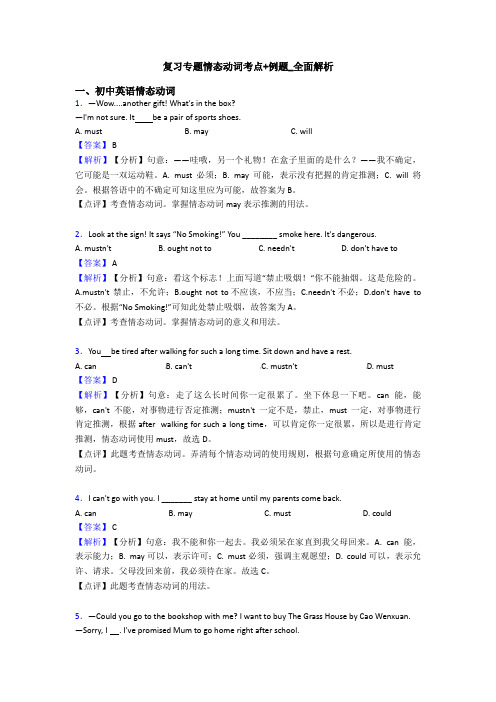
复习专题情态动词考点+例题_全面解析一、初中英语情态动词1.—Wow....another gift! What's in the box?—I'm not sure. It be a pair of sports shoes.A. mustB. mayC. will【答案】 B【解析】【分析】句意:——哇哦,另一个礼物!在盒子里面的是什么?——我不确定,它可能是一双运动鞋。
A. must必须;B. may可能,表示没有把握的肯定推测;C. will将会。
根据答语中的不确定可知这里应为可能,故答案为B。
【点评】考查情态动词。
掌握情态动词may表示推测的用法。
2.Look at the sign! It says “No Smoking!” You ________ smoke here. It's dangerous.A. mustn'tB. ought not toC. needn'tD. don't have to【答案】 A【解析】【分析】句意:看这个标志!上面写道“禁止吸烟!“你不能抽烟。
这是危险的。
A.mustn't 禁止,不允许;B.ought not to不应该,不应当;C.needn't不必;D.don't have to 不必。
根据“No Smoking!”可知此处禁止吸烟,故答案为A。
【点评】考查情态动词。
掌握情态动词的意义和用法。
3.You be tired after walking for such a long time. Sit down and have a rest.A. canB. can'tC. mustn'tD. must【答案】 D【解析】【分析】句意:走了这么长时间你一定很累了。
坐下休息一下吧。
can能,能够,can't不能,对事物进行否定推测;mustn't一定不是,禁止,must一定,对事物进行肯定推测,根据after walking for such a long time,可以肯定你一定很累,所以是进行肯定推测,情态动词使用must,故选D。
【英语】高考英语情态动词真题汇编(含答案)及解析
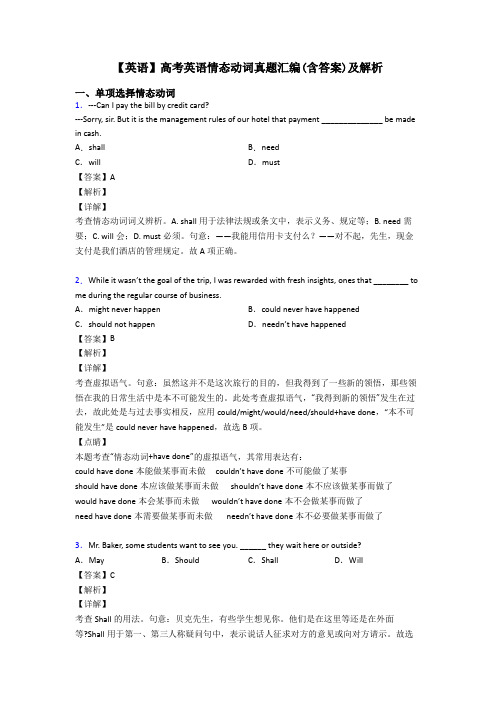
(2)We shall have a good time in the park.我们在公园里会玩得很高兴的。常考的特殊用法
1. Shall用于第一人称,表示征求对方的意愿。如:What shall we do this evening?
8.—You rang me up at about 10:00 last night, didn't you?
—No, I didn't phone you. Itsomeone else.
A.must have beenB.could beC.must beD.could have been
【答案】A
【答案】C
【解析】
【详解】
考查Shall的用法。句意:贝克先生,有些学生想见你。他们是在这里等还是在外面等?Shall用于第一、第三人称疑问句中,表示说话人征求对方的意见或向对方请示。故选C。
【点睛】
Shall的用法
Shall作为助动词,一般用于第一人称Ⅰ和We,表示一个将来的动作,构成将来时态。Shall后面接动词原形。例如:
11.—Sorry, Mum! I failed the job interview again.
—Oh, it's too bad. You________ have made full preparations.
A.mustB.canC.wouldD.should
【答案】D
【解析】
【详解】
考查情态动词+have done结构。句意:—对不起,妈妈,我面试又失败了。—噢,那太糟糕了,你应该做好充分准备的。A.must必须;B.can可以;C.would将会;D.should应该。这里是情态+have done的结构的虚拟语气,can+have+done”表示对过去行为的怀疑,用于疑问句,译成“可能做过……吗?”;could+have+done,表示对过去事情的假设,意思是本来能够做某事而没有做;must+have+done”表示对过去事情的肯定推测,译成“一定做过某事”,该结构只用于肯定句;should+have+done意思是“本来应该做某事,而实际没做”。故选D
情态动词经典例题

情态动词经典例题一、情态动词单项选择题1.You _______ lose your way if you walk alone in the mountains(山) at night.A.may B.need C.can D.should【答案】A【解析】【详解】句意:如果你晚上一个人在山里走,你可能会迷路。
考查情态动词辨析。
may可能;need需要;can能,会;should应该。
根据“if you walk alone in the mountains(山) at night.”可知,此次是可能会迷路。
may是情态动词表示推测,故选A。
2.—May I have some wine to drink?—No, you ________. You have to drive home later.A.mustn’t B.needn’t C.can’t D.may not【答案】A【解析】【详解】句意:——我可以喝点酒吗?——不,你不能。
你一会儿得开车回家。
考查情态动词。
mustn’t不可以,表禁止;needn’t不需要;can’t不可能;may not可能不是。
上句询问能否喝点酒,结合“drive home”可知,开车不能喝酒,表禁止,故用mustn’t。
故选A。
3.Bill has been driving all day. He ________ be tired.A.need B.must C.shall D.can【答案】B【解析】【详解】句意:Bill已经开了一整天的车了。
他一定累了。
考查情态动词表推测。
need需要;must一定;shall将,会;can能够。
根据“Bill has been driving all day.”可知,Bill一定很累了。
此处用must表示肯定推测。
故选B。
4.—Mr Zhong, why should we have to wash hands so often a day?—For your health, you ________ be too careful.A.needn’t B.shouldn’t C.mustn’t D.can’t【答案】D【解析】【详解】句意:——钟老师,为什么我们一天要洗手这么勤?——为了你的健康,你再怎么小心也不为过。
初中情态动词知识点及习题(附答案)
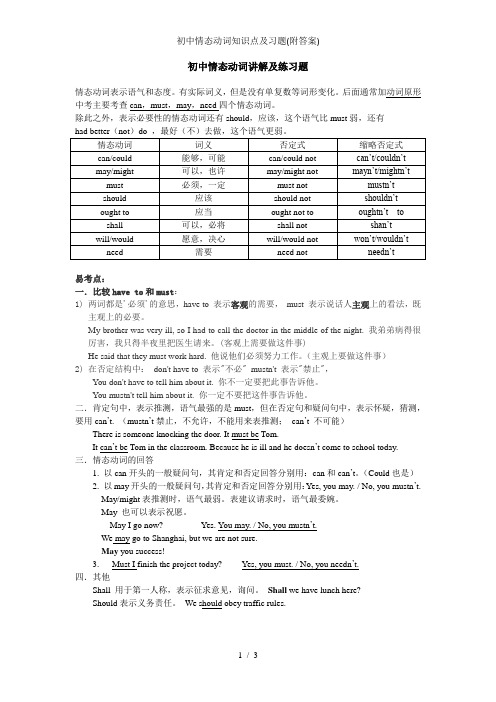
初中情态动词讲解及练习题情态动词表示语气和态度。
有实际词义,但是没有单复数等词形变化。
后面通常加动词原形中考主要考查can,must,may,need四个情态动词。
除此之外,表示必要性的情态动词还有should,应该,这个语气比must弱,还有易考点:一.比较have to和must:1) 两词都是'必须'的意思,have to表示客观的需要,must 表示说话人主观上的看法,既主观上的必要。
My brother was very ill, so I had to call the doctor in the middle of the night.我弟弟病得很厉害,我只得半夜里把医生请来。
(客观上需要做这件事)He said that they must work hard.他说他们必须努力工作。
(主观上要做这件事)2) 在否定结构中:don't have to 表示"不必" mustn't表示"禁止",You don't have to tell him about it. 你不一定要把此事告诉他。
You mustn't tell him about it. 你一定不要把这件事告诉他。
二.肯定句中,表示推测,语气最强的是must,但在否定句和疑问句中,表示怀疑,猜测,要用can’t. (mustn’t禁止,不允许,不能用来表推测;can’t 不可能)There is someone knocking the door. It must be Tom.It can’t be Tom in the classroom. Because he is ill and he doesn’t come to school today.三.情态动词的回答1. 以can开头的一般疑问句,其肯定和否定回答分别用:can和can’t。
高考情态动词讲解及习题(附答案)
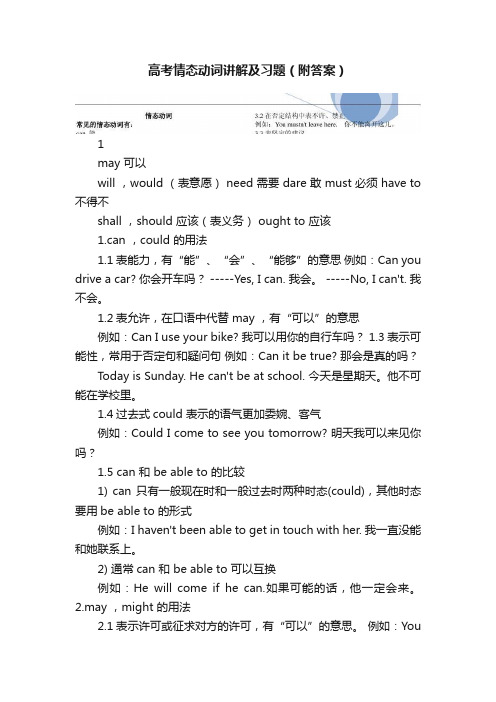
高考情态动词讲解及习题(附答案)1may 可以will ,would (表意愿) need 需要 dare 敢 must 必须 have to 不得不shall ,should 应该(表义务) ought to 应该1.can ,could 的用法1.1表能力,有“能”、“会”、“能够”的意思例如:Can you drive a car? 你会开车吗? -----Yes, I can. 我会。
-----No, I can't. 我不会。
1.2表允许,在口语中代替 may ,有“可以”的意思例如:Can I use your bike? 我可以用你的自行车吗? 1.3表示可能性,常用于否定句和疑问句例如:Can it be true? 那会是真的吗?Today is Sunday. He can't be at school. 今天是星期天。
他不可能在学校里。
1.4过去式could 表示的语气更加委婉、客气例如:Could I come to see you tomorrow? 明天我可以来见你吗?1.5 can 和 be able to 的比较1) can 只有一般现在时和一般过去时两种时态(could),其他时态要用be able to 的形式例如:I haven't been able to get in touch with her. 我一直没能和她联系上。
2) 通常can 和 be able to 可以互换例如:He will come if he can.如果可能的话,他一定会来。
2.may ,might 的用法2.1表示许可或征求对方的许可,有“可以”的意思。
例如:Youmay go now. 你可以走了。
May I use your computer? 我用一下你的电脑可以吗? 2.2回答以may 开头的疑问句有如下表达法:例如:May I smoke here? 我可以在这儿抽烟吗? -----Yes, you may. -----Yes, please. ------No, you can't. ------No, you mustn't. ------No, you'd better not.2.3表示猜测,通常只用于陈述句例如:You may be right. 你可能是对的。
(完整版)小学英语情态动词知识点及练习

情态动词【知识要点】:情态动词(Modal verbs)本身有一定的词义,表示语气的单词。
但是不能独立作谓语,只能和动词原形一起构成谓语。
情态动词用在行为动词前,表示说话人对这一动作或状态的看法或主观设想。
情态动词虽然数量不多,但用途广泛,主要有下列: can (could), may (might), must, need, ought to, dare (dared), shall (should), will (would) must not.情态动词无人称和数的变化,情态动词后面跟的动词须用原形,否定式构成是在情态动词后面加 "not"。
疑问形式是将情态动词提至主语前。
个别情态动词有现在式和过去式两种形式,过去式用来表达更加客气,委婉的语气,时态性不强,可用于过去,现在或将来。
情态动词属非及物动词,故没有被动语态。
【典型例题】:【专题一】:can和could的用法【例1】Can you lift this heavy box?(体力)【解析】表示能力(体力、知识、技能)【练习】1.Mary speak three languages.(知识)2. you skate?(技能)此时可用be able to代替。
Can只有一般现在时和一般过去式;而be able to 则有更多的时态。
I’ll not be able to come this afternoon.当表示“经过努力才得以做成功某事”时应用be able to,不能用Can。
【例2】-----Can I go now?----- Yes, you can. / No, you can’t.【解析】表示请求和允许。
此时可与may互换。
在疑问句中还可用could,might 代替,不是过去式,只是语气更委婉,不能用于肯定句和答语中。
【练习】---- I come to see you tomorrow?---- Yes, you .----No, you /I’m afraid not.【例3】Can this be true?【解析】表示推测(惊讶、怀疑、不相信的态度),用于疑问句、否定句和感叹句中。
高中英语词法之情态动词典型例题及答题技巧
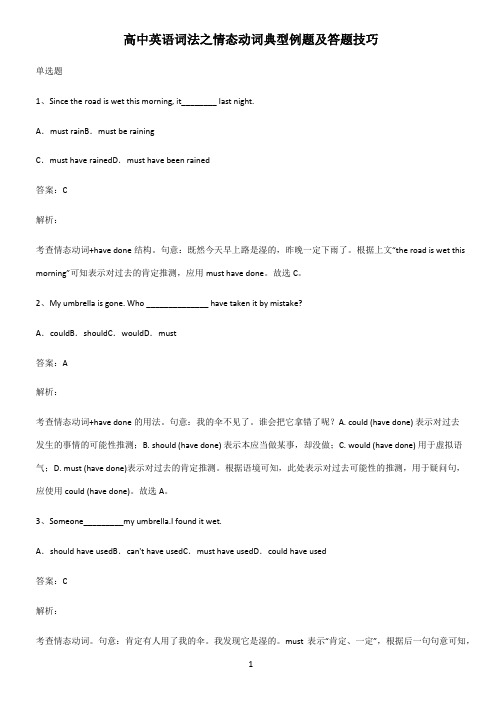
高中英语词法之情态动词典型例题及答题技巧单选题1、Since the road is wet this morning, it________ last night.A.must rainB.must be rainingC.must have rainedD.must have been rained答案:C解析:考查情态动词+have done结构。
句意:既然今天早上路是湿的,昨晚一定下雨了。
根据上文“the road is wet this morning”可知表示对过去的肯定推测,应用must have done。
故选C。
2、My umbrella is gone. Who ______________ have taken it by mistake? A.couldB.shouldC.wouldD.must答案:A解析:考查情态动词+have done的用法。
句意:我的伞不见了。
谁会把它拿错了呢?A. could (have done) 表示对过去发生的事情的可能性推测;B. should (have done) 表示本应当做某事,却没做;C. would (have done) 用于虚拟语气;D. must (have done)表示对过去的肯定推测。
根据语境可知,此处表示对过去可能性的推测,用于疑问句,应使用could (have done)。
故选A。
3、Someone_________my umbrella.I found it wet.A.should have usedB.can't have usedC.must have usedD.could have used答案:C解析:考查情态动词。
句意:肯定有人用了我的伞。
我发现它是湿的。
must表示“肯定、一定”,根据后一句句意可知,第一句是对过去动作的肯定猜测,用must have done,故选C。
4、It ___________ last night, for the road was very muddy.A.would have rainedB.must have rainedC.should have rainedD.must rain答案:B解析:考查情态动词+have done。
全面解析初中英语情态动词100例与答案
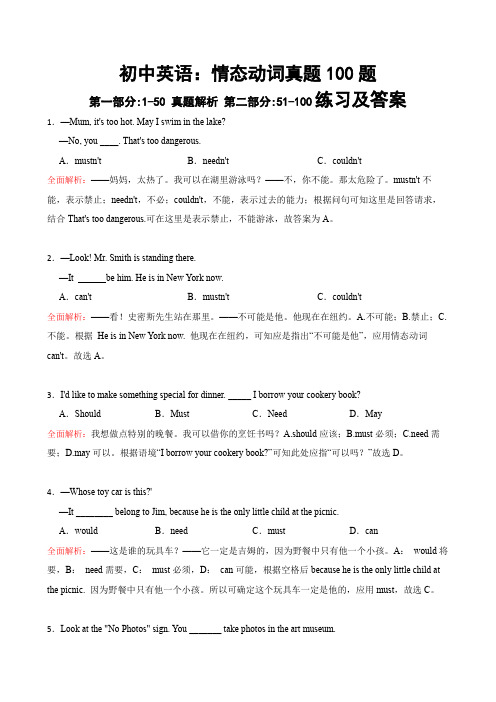
初中英语:情态动词真题100题第一部分:1-50 真题解析第二部分:51-100练习及答案1.—Mum, it's too hot. May I swim in the lake?—No, you ____. That's too dangerous.A.mustn't B.needn't C.couldn't全面解析:——妈妈,太热了。
我可以在湖里游泳吗?——不,你不能。
那太危险了。
mustn't不能,表示禁止;needn't,不必;couldn't,不能,表示过去的能力;根据问句可知这里是回答请求,结合That's too dangerous.可在这里是表示禁止,不能游泳,故答案为A。
2.—Look! Mr. Smith is standing there.—It be him. He is in New York now.A.can't B.mustn't C.couldn't全面解析:——看!史密斯先生站在那里。
——不可能是他。
他现在在纽约。
A.不可能;B.禁止;C.不能。
根据He is in New York now. 他现在在纽约,可知应是指出“不可能是他”,应用情态动词can't。
故选A。
3.I'd like to make something special for dinner. _____ I borrow your cookery book?A.Should B.Must C.Need D.May全面解析:我想做点特别的晚餐。
我可以借你的烹饪书吗?A.should应该;B.must必须;C.need需要;D.may可以。
根据语境“I borrow your cookery book?”可知此处应指“可以吗?”故选D。
4.—Whose toy car is this?'—It ________ belong to Jim, because he is the only little child at the picnic.A.would B.need C.must D.can全面解析:——这是谁的玩具车?——它一定是吉姆的,因为野餐中只有他一个小孩。
初中英语情态动词解析
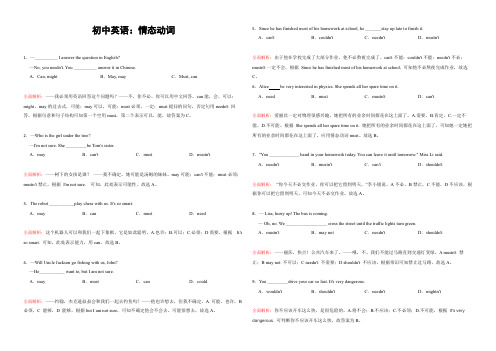
初中英语:情态动词1.—__________ I answer the question in English?—No, you needn't. You __________ answer it in Chinese.A.Can, might B.May, may C.Must, can全面解析:——我必须用英语回答这个问题吗?——不,你不必。
你可以用中文回答。
can能,会,可以;might,may的过去式,可能;may可以,可能;must必须,一定;must提问的问句,否定句用needn't 回答,根据句意和句子结构可知第一个空用must,第二个表示可以,能,故答案为C。
2.—Who is the girl under the tree?—I'm not sure. She _________be Tom's sister.A.may B.can't C.must D.mustn't全面解析:——树下的女孩是谁?——我不确定。
她可能是汤姆的妹妹。
may可能;can't不能;must必须;mustn't禁止。
根据I'm not sure. 可知,此处表示可能性。
故选A。
3.The robot ___________play chess with us. It's so smart.A.may B.can C.must D.need全面解析:这个机器人可以和我们一起下象棋。
它是如此聪明。
A.也许;B.可以;C.必须;D需要。
根据It's so smart. 可知,此处表示能力,用can,故选B。
4.—Will Uncle Jackson go fishing with us, John?—He___________ want to, but I am not sure.A.may B.must C.can D.could全面解析:——约翰,杰克逊叔叔会和我们一起去钓鱼吗?——他也许想去,但我不确定。
【英语】情态动词考点+例题-全面解析

【英语】情态动词考点+例题-全面解析一、初中英语情态动词1.— I take the magazine out of the reading room?— I'm sorry you .A. Could; couldn'tB. Must; couldn'tC. Will; can'tD. May; can't【答案】 D【解析】【分析】句意:——我可以把杂志带出阅览室吗?——对不起,你不能。
could 能,可以;must必须;will将;may可以;can能,可以,can't不可以,不能。
此处表示请求许可,用could或者may,由could或者may构成的一般疑问句,肯定回答用yes,主语+can,否定回答用sorry,主语+can't,结合选项,故答案选D。
【点评】考查情态动词的辨析。
注意理解句意,理解选项,根据语境,选出正确的答案。
2.—Where is Monica? I can't find her anywhere.—She be in the library. She loves reading books when she is free.A. mustB. needC. can't【答案】 A【解析】【分析】句意:——莫妮卡在哪?我到处都找不到她。
——她肯定在图书馆,她喜欢空闲时看书。
A肯定,肯定句中表示推测,B需要,C不可能,否定句中表示推测,根据 She loves reading books when she is free ,可知是肯定句表示推测,故选A。
【点评】考查情态动词,注意情态动词表推测的用法。
3.Look at the sign! It says “No Smoking!” You ________ smoke here. It's dangerous.A. mustn'tB. ought not toC. needn'tD. don't have to【答案】 A【解析】【分析】句意:看这个标志!上面写道“禁止吸烟!“你不能抽烟。
高中英语情态动词常见题型及答题技巧及练习题(含答案)及解析

高中英语情态动词常见题型及答题技巧及练习题(含答案)及解析一、单项选择情态动词1.I often felt troubled in my teens and my grandma ________ comfort me, saying “Life is like that, dear”.A.would B.might C.should D.must【答案】A【解析】【详解】考查情态动词。
句意:在我十几岁的时候,我经常感到烦恼,我的奶奶会安慰我说,“生活就是这样,亲爱的”。
此处是would+动词原形,表示“过去总是做某事”。
故选A。
2.—I feel a little nervous.—Take it easy. You __________ have difficulty passing the exam when you have prepared for it well.A.mustn’t B.needn’t C.may not D.shouldn’t【答案】D【解析】【详解】考查情态动词。
句意:——我觉得有点紧张。
——不要着急。
当你准备充分时,通过考试应该不会有困难。
A. mustn’t禁止,不允许;B. needn’t不必;C. may not可能不会;D. shouldn’t不应该。
结合句意可知答案为D。
3.—It’s already 11 o’clock , and he ______ have been here half an hour ago.—Maybe he got caught in the rain.A.must B.ought toC.may D.can【答案】B【解析】【详解】考查情态动词。
句意:已经11点了,他半小时前就该到了。
A. must have done必定做了…(表示对过去的推测);B. ought to have done 本应该做的;C. may have done可能已经做过某事;D. can have done本来可以做的(但没有做),根据题意,故选B。
【英语】情态动词高考真题解析
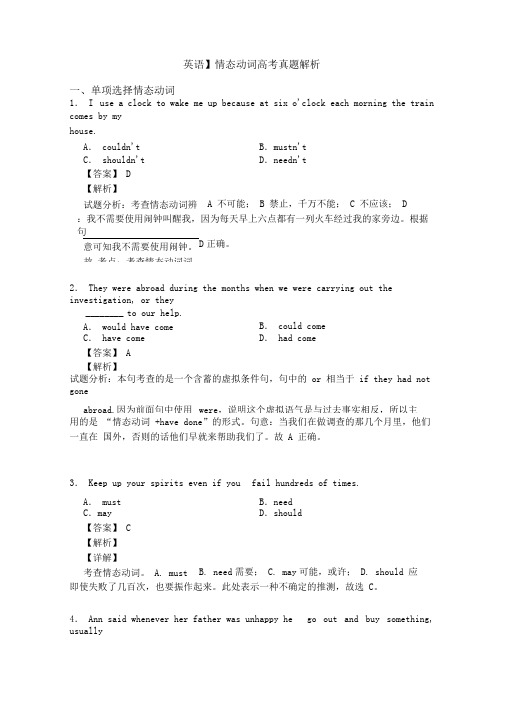
英语】情态动词高考真题解析一、单项选择情态动词1. I use a clock to wake me up because at six o'clock each morning the train comes by myhouse.A. couldn't B.mustn'tC. shouldn't【答案】 D【解析】试题分析:考查情态动词辨D.needn'tA 不可能;B 禁止,千万不能;C 不应该; D:我不需要使用闹钟叫醒我,因为每天早上六点都有一列火车经过我的家旁边。
根据句意可知我不需要使用闹钟。
故考点:考查情态动词词D正确。
2. They were abroad during the months when we were carrying out the investigation, or they________ to our help.A. would have come B. could comeC. have come【答案】 A【解析】D. had come试题分析:本句考查的是一个含蓄的虚拟条件句,句中的 or 相当于 if they had not goneabroad.因为前面句中使用were,说明这个虚拟语气是与过去事实相反,所以主用的是“情态动词 +have done”的形式。
句意:当我们在做调查的那几个月里,他们一直在国外,否则的话他们早就来帮助我们了。
故 A 正确。
3. Keep up your spirits even if you fail hundreds of times.A. must B.needC.may【答案】 C【解析】【详解】考查情态动词。
A. mustD.shouldB. need需要;C. may可能,或许;D. should 应该。
句意:即使失败了几百次,也要振作起来。
此处表示一种不确定的推测,故选 C。
100例全面解析初中英语情态动词专项练习与答案
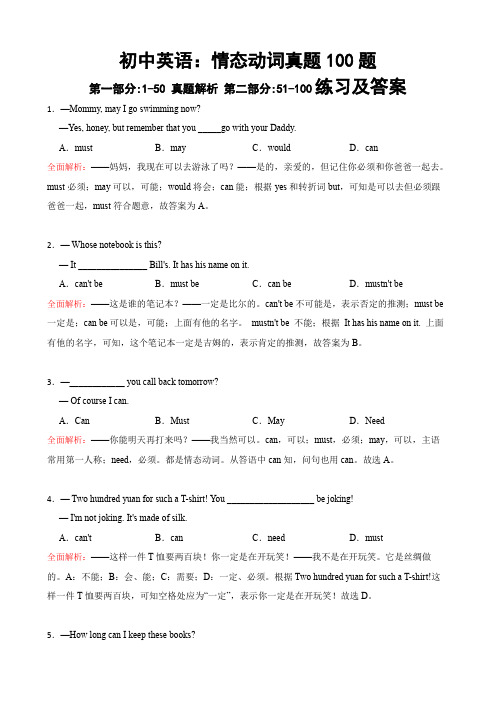
初中英语:情态动词真题100题第一部分:1-50 真题解析第二部分:51-100练习及答案1.—Mommy, may I go swimming now?—Yes, honey, but remember that you _____go with your Daddy.A.must B.may C.would D.can全面解析:——妈妈,我现在可以去游泳了吗?——是的,亲爱的,但记住你必须和你爸爸一起去。
must必须;may可以,可能;would将会;can能;根据yes和转折词but,可知是可以去但必须跟爸爸一起,must符合题意,故答案为A。
2.— Whose notebook is this?— It _______________ Bill's. It has his name on it.A.can't be B.must be C.can be D.mustn't be全面解析:——这是谁的笔记本?——一定是比尔的。
can't be不可能是,表示否定的推测;must be 一定是;can be可以是,可能;上面有他的名字。
mustn't be 不能;根据It has his name on it. 上面有他的名字,可知,这个笔记本一定是吉姆的,表示肯定的推测,故答案为B。
3.—____________ you call back tomorrow?— Of course I can.A.Can B.Must C.May D.Need全面解析:——你能明天再打来吗?——我当然可以。
can,可以;must,必须;may,可以,主语常用第一人称;need,必须。
都是情态动词。
从答语中can知,问句也用can。
故选A。
4.— Two hundred yuan for such a T-shirt! You ___________________ be joking!— I'm not joking. It's made of silk.A.can't B.can C.need D.must全面解析:——这样一件T恤要两百块!你一定是在开玩笑!——我不是在开玩笑。
高考英语情态动词讲解及习题(附答案)
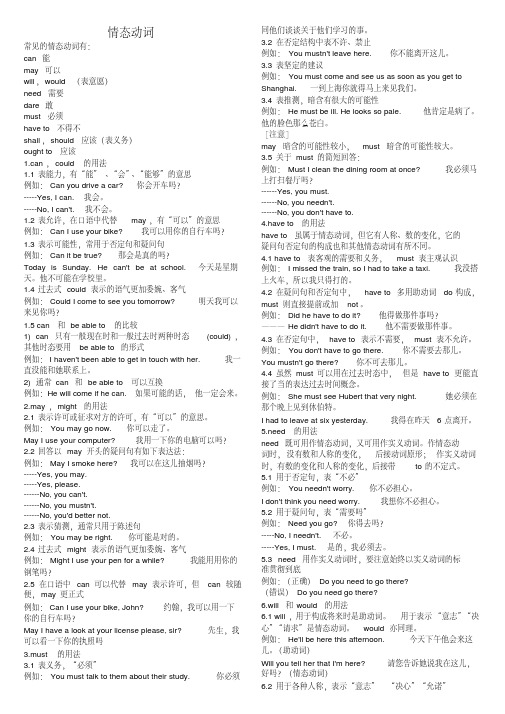
情态动词常见的情态动词有:can 能may 可以will,would (表意愿)need 需要dare 敢must 必须have to 不得不shall,should 应该(表义务)ought to 应该1.can,could 的用法1.1表能力,有“能”、“会”、“能够”的意思例如:Can you drive a car? 你会开车吗?-----Yes, I can. 我会。
-----No, I can't. 我不会。
1.2表允许,在口语中代替may,有“可以”的意思例如:Can I use your bike?我可以用你的自行车吗?1.3表示可能性,常用于否定句和疑问句例如:Can it be true?那会是真的吗?Today is Sunday. He can't be at school.今天是星期天。
他不可能在学校里。
1.4过去式could表示的语气更加委婉、客气例如:Could I come to see you tomorrow?明天我可以来见你吗?1.5 can 和be able to 的比较1) can 只有一般现在时和一般过去时两种时态(could),其他时态要用be able to的形式例如:I haven't been able to get in touch with her.我一直没能和她联系上。
2) 通常can 和be able to 可以互换例如:He will come if he can.如果可能的话,他一定会来。
2.may,might的用法2.1表示许可或征求对方的许可,有“可以”的意思。
例如:You may go now.你可以走了。
May I use your computer?我用一下你的电脑可以吗?2.2回答以may开头的疑问句有如下表达法:例如:May I smoke here? 我可以在这儿抽烟吗?-----Yes, you may.-----Yes, please.------No, you can't.------No, you mustn't.------No, you'd better not.2.3表示猜测,通常只用于陈述句例如:You may be right.你可能是对的。
情态动词详解、典型例题及模拟试题(含答案)教学文案
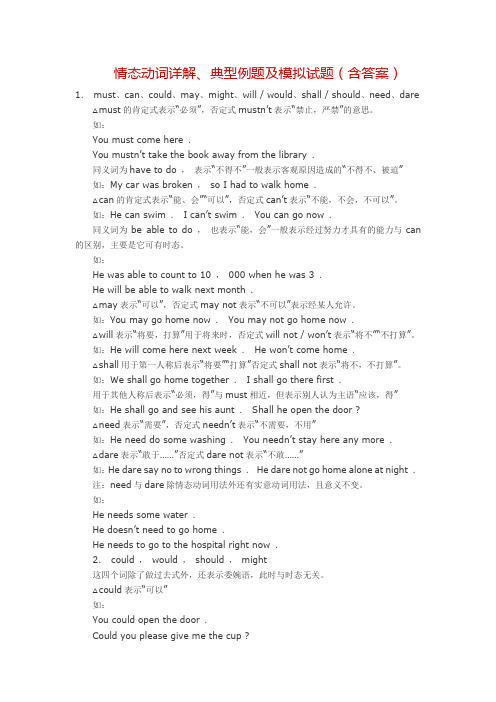
情态动词详解、典型例题及模拟试题(含答案)1.must、can、could、may、might、will / would、shall / should、need、dare △must的肯定式表示“必须”,否定式mustn’t表示“禁止,严禁”的意思。
如:You must come here .You mustn’t take the book away from the library .同义词为have to do ,表示“不得不”一般表示客观原因造成的“不得不、被迫”如:My car was broken ,so I had to walk home .△can的肯定式表示“能、会”“可以”,否定式can’t表示“不能,不会,不可以”。
如:He can swim .I can’t swim .You can go now .同义词为be able to do ,也表示“能,会”一般表示经过努力才具有的能力与can 的区别,主要是它可有时态。
如:He was able to count to 10 ,000 when he was 3 .He will be able to walk next month .△may表示“可以”,否定式may not表示“不可以”表示经某人允许。
如:You may go home now .You may not go home now .△will表示“将要,打算”用于将来时,否定式will not / won’t表示“将不”“不打算”。
如:He will come here next week .He won’t come home .△shall用于第一人称后表示“将要”“打算”否定式shall not表示“将不,不打算”。
如:We shall go home together .I shall go there first .用于其他人称后表示“必须,得”与must相近,但表示别人认为主语“应该,得”如:He shall go and see his aunt .Shall he open the door ?△need表示“需要”,否定式needn’t表示“不需要,不用”如:He need do some washing .You needn’t stay here any more .△dare表示“敢于……”否定式dare not表示“不敢……”如:He dare say no to wrong things .He dare not go home alone at night .注:need与dare除情态动词用法外还有实意动词用法,且意义不变。
高考英语情态动词讲解及习题(附答案)
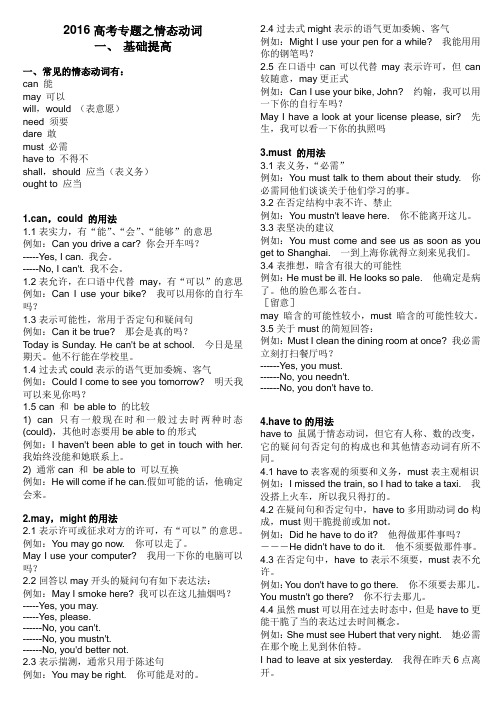
2016高考专题之情态动词一、基础提高一、常见的情态动词有:can 能may 可以will,would (表意愿)need 须要dare 敢must 必需have to 不得不shall,should 应当(表义务)ought to 应当1.can,could 的用法1.1表实力,有“能”、“会”、“能够”的意思例如:Can you drive a car? 你会开车吗?-----Yes, I can. 我会。
-----No, I can't. 我不会。
1.2表允许,在口语中代替may,有“可以”的意思例如:Can I use your bike?我可以用你的自行车吗?1.3表示可能性,常用于否定句和疑问句例如:Can it be true?那会是真的吗?Today is Sunday. He can't be at school.今日是星期天。
他不行能在学校里。
1.4过去式could表示的语气更加委婉、客气例如:Could I come to see you tomorrow?明天我可以来见你吗?1.5 can 和be able to 的比较1) can 只有一般现在时和一般过去时两种时态(could),其他时态要用be able to的形式例如:I haven't been able to get in touch with her.我始终没能和她联系上。
2) 通常can 和be able to 可以互换例如:He will come if he can.假如可能的话,他确定会来。
2.may,might的用法2.1表示许可或征求对方的许可,有“可以”的意思。
例如:You may go now.你可以走了。
May I use your computer?我用一下你的电脑可以吗?2.2回答以may开头的疑问句有如下表达法:例如:May I smoke here? 我可以在这儿抽烟吗?-----Yes, you may.-----Yes, please.------No, you can't.------No, you mustn't.------No, you'd better not.2.3表示揣测,通常只用于陈述句例如:You may be right.你可能是对的。
情态动词详解、典型例题及模拟试题(含答案)
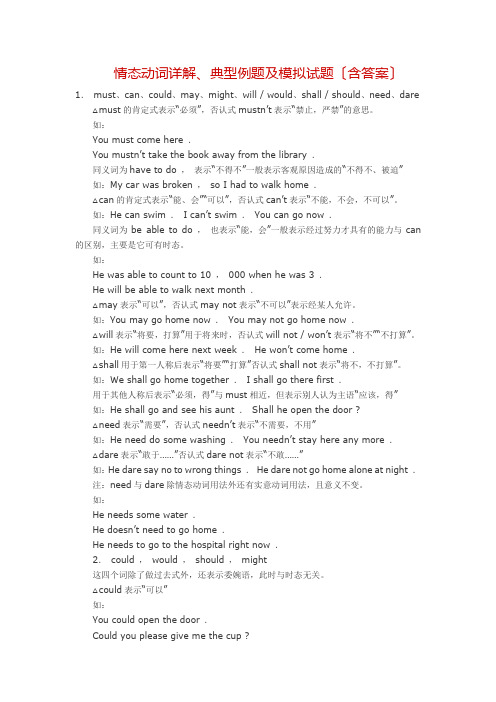
情态动词详解、典型例题及模拟试题〔含答案〕1.must、can、could、may、might、will / would、shall / should、need、dare △must的肯定式表示“必须”,否认式mustn’t表示“禁止,严禁”的意思。
如:You must come here .You mustn’t take the book away from the library .同义词为have to do ,表示“不得不”一般表示客观原因造成的“不得不、被迫”如:My car was broken ,so I had to walk home .△can的肯定式表示“能、会”“可以”,否认式can’t表示“不能,不会,不可以”。
如:He can swim .I can’t swim .You can go now .同义词为be able to do ,也表示“能,会”一般表示经过努力才具有的能力与can 的区别,主要是它可有时态。
如:He was able to count to 10 ,000 when he was 3 .He will be able to walk next month .△may表示“可以”,否认式may not表示“不可以”表示经某人允许。
如:You may go home now .You may not go home now .△will表示“将要,打算”用于将来时,否认式will not / won’t表示“将不”“不打算”。
如:He will come here next week .He won’t come home .△shall用于第一人称后表示“将要”“打算”否认式shall not表示“将不,不打算”。
如:We shall go home together .I shall go there first .用于其他人称后表示“必须,得”与must相近,但表示别人认为主语“应该,得”如:He shall go and see his aunt .Shall he open the door ?△need表示“需要”,否认式needn’t表示“不需要,不用”如:He need do some washing .You needn’t stay here any more .△dare表示“敢于……”否认式dare not表示“不敢……”如:He dare say no to wrong things .He dare not go home alone at night .注:need与dare除情态动词用法外还有实意动词用法,且意义不变。
(完整版)初中英语情态动词讲解练习和答案解析.docx
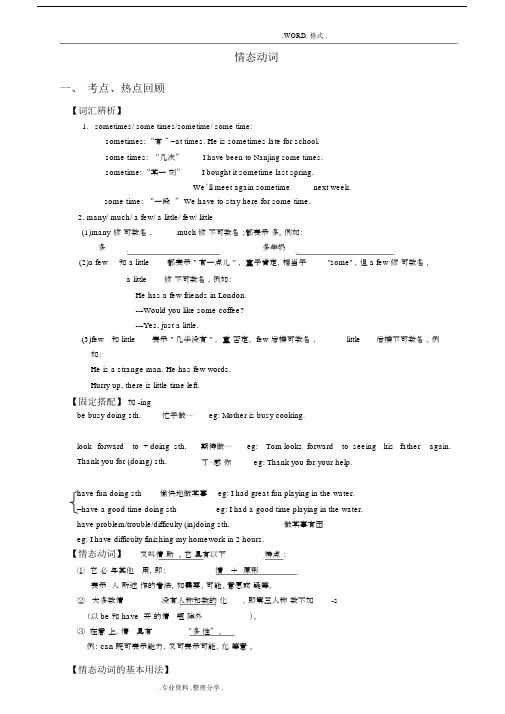
.WORD. 格式 .情态动词一、考点、热点回顾【词汇辨析】1.sometimes/ some times/sometime/ some time:sometimes: “有” =at times. He is sometimes late for school.some times:“几次”I have been to Nanjing some times.sometime: “某一刻”I bought it sometime last spring.We’ll meet again sometime next week.some time:“一段” We have to stay here for some time.2. many/ much/ a few/ a little/ few/ little(1)many 修可数名,much修不可数名;都表示多。
例如:多多牛奶(2)a few和a little都表示"有一点儿",重于肯定,相当于"some" ,但 a few 修可数名,a little修不可数名,例如:He has a few friends in London.---Would you like some coffee?---Yes, just a little.(3)few和little表示"几乎没有",重否定。
few后接可数名,little后接不可数名。
例如:He is a strange man. He has few words.Hurry up, there is little time left.【固定搭配】加 -ingbe busy doing sth.忙于做⋯⋯eg: Mother is busy cooking.look forward to + doing sth. Thank you for (doing) sth.期待做⋯⋯eg: Tom looks forward to seeing his father again.了⋯感你eg: Thank you for your help.have fun doing sth愉快地做某事eg: I had great fun playing in the water. =have a good time doing sth eg: I had a good time playing in the water. have problem/trouble/difficulty (in)doing sth.做某事有困eg: I have difficulty finishing my homework in 2 hours.【情态动词】又叫情助。
英语情态动词完整归纳含答案解析百度文库

英语情态动词完整归纳含答案解析百度文库一、初中英语情态动词1.— Dick, ________ I use your e-dictionary? — Yes, sure. ________ you give it to David after you use it?A. will; WouldB. may; MightC. can; CouldD. shall; Should【答案】 C【解析】【分析】句意:一Dick我可用一下你的电子词典吗?一当然可以。
在你用完后你能把它给他David吗?根据句意及题干分析第一空表示请求允许,所以可以用may或can;第二空是表示对别人的请求.所以用could表示更加委婉,故选C。
2.—Where is Monica? I can't find her anywhere.—She be in the library. She loves reading books when she is free.A. mustB. needC. can't【答案】 A【解析】【分析】句意:——莫妮卡在哪?我到处都找不到她。
——她肯定在图书馆,她喜欢空闲时看书。
A肯定,肯定句中表示推测,B需要,C不可能,否定句中表示推测,根据 She loves reading books when she is free ,可知是肯定句表示推测,故选A。
【点评】考查情态动词,注意情态动词表推测的用法。
3.Look at the sign! It says “No Smoking!” You ________ smoke here. It's dangerous.A. mustn'tB. ought not toC. needn'tD. don't have to【答案】 A【解析】【分析】句意:看这个标志!上面写道“禁止吸烟!“你不能抽烟。
这是危险的。
- 1、下载文档前请自行甄别文档内容的完整性,平台不提供额外的编辑、内容补充、找答案等附加服务。
- 2、"仅部分预览"的文档,不可在线预览部分如存在完整性等问题,可反馈申请退款(可完整预览的文档不适用该条件!)。
- 3、如文档侵犯您的权益,请联系客服反馈,我们会尽快为您处理(人工客服工作时间:9:00-18:30)。
情态动词考点+例题-全面解析一、初中英语情态动词1.You __________ write the poem down. Our teacher will give us a copy soon.A. needn'tB. mustn'tC. shouldn'tD. can't【答案】A【解析】【分析】句意:你不需要把诗抄下来,老师很快会给我们一份。
A.不必;B.不准,禁止,不允许;C.不应该,表示责任、义务;D.不能,表示能力,不可能,表示否定的推测。
老师要给我们一份,所以不必抄写。
故选A。
2.—I wonder if this smart phone is Mary's.—It _______ belong to her. _______ is totally different from this one.A. mustn't; HerB. can't; HerC. can't; HersD. may; Hers 【答案】C【解析】【分析】句意:――我想知道这个智能机是否是玛丽的。
――不可能属于她,她的和这个完全不同。
情态动词表示推测时,用must表示“一定”,用might, could表示“可能”,用can't表示“不可能”。
从句意看,这手机与她的完全不同,故不可能是她的,前面用can't。
形容词性的物主代词后一定有一个被修饰的名词,名词性的物主代词后没有被其修饰的词,本题后没有被修饰的词,用名词性的物主代词,“她的”:hers。
故选C。
3.We don't allow taking magazines out, but you ____________ copy the article you need on the machine over there.A. canB. mustC. shouldD. would【答案】 A【解析】【分析】句意:我们不允许把杂志带出去,但是你可以在那里抄下你需要的文章。
can能,能够,可以;must必须;should应该;would将;此处表示可以,允许,故选A。
【点评】此题考查情态动词辨析。
弄清每个情态动词的使用规则,根据上下文的联系确定所使用的情态动词。
4.—He be in the classroom,I think.—No, he be in the classroom. I saw him go home a minute ago.A. can; may notB. must; may notC. may; mustn'tD. may; can't 【答案】 D【解析】【分析】句意:——我认为他可能在教室里。
——不,他肯定没有在教室里,我刚才看到他回家了。
must,can(could),may(might)可以表示猜测,must表示肯定猜测,用于肯定句,肯定……一定……;can't表示否定猜测,肯定不……,另外can(could),may (might),表示可能性猜测,可能……根据I think,可知把握较小,根据I saw him go home a minute ago.可知第二句把握大,故选D。
5.Rock music ______ sound popular with the young, but it's not the favor of the aged people.A. mustB. needC. shouldD. may【答案】 D【解析】【分析】句意:摇滚音乐在年轻人中听起来受欢迎,但是它不受上了年龄的人的赞同。
must, 表示猜测时,指把握比较大的肯定猜测,肯定……;need需要;should,应该;may,表示把握比较小的肯定猜测,可能,也许。
结合句意,故选D。
【点评】考查情态动词辨析,注意几个常见情态动词的意思和用法。
6.—Must I clean the classroom now? —No, you_______.A. mustn'tB. can'tC. needn't【答案】 C【解析】【分析】句意:--我必须现在把教室打扫干净吗?--不,你不必。
must I do …?的否定回答是No, you needn't 或者 No , you don't have to 。
根据是否定回答,故选C。
7.— We've ordered too much food. I eat any more.—Never mind. Let' take it home.A. can'tB. mustn'tC. needn'tD. shouldn't【答案】 A【解析】【分析】句意:——我们已经点了太多的食物,我不能再吃了。
——没关系,我们带回家吧。
can't不能;mustn't必须不;一定不要;needn't不必;shouldn't不应该。
根据句意可知选A。
【点评】考查情态动词辨析。
8.All passengers ______ go through safety check before they take a plane.A. canB. mayC. mustD. could【答案】 C【解析】【分析】句意:所有乘客登机前必须接受安全检查。
A. can能够,表示能力;B. may可以,表示许可;C. must必须;D. could可能,可以。
登机前必须安检。
故选C。
【点评】情态动词词义辨析。
以及can、may、must、could四个词的词义和用法。
9.—Wow....another gift! What's in the box?—I'm not sure. It be a pair of sports shoes.A. mustB. mayC. will【答案】 B【解析】【分析】句意:——哇哦,另一个礼物!在盒子里面的是什么?——我不确定,它可能是一双运动鞋。
A. must必须;B. may可能,表示没有把握的肯定推测;C. will将会。
根据答语中的不确定可知这里应为可能,故答案为B。
【点评】考查情态动词。
掌握情态动词may表示推测的用法。
10.You _____ walk too close to the edge of the path because you might fall and hurt yourself.A. mayB. mightC. needn'tD. musn't【答案】 D【解析】【分析】句意:你不能走得太靠近路的边缘,因为你可能跌倒伤害自己。
A. may可以,表允许;B. might可能,表推测;C. needn't不必,指没有必要;D. musn't不能,表示不允许或禁止。
根据句意语境,本句是不允许离路边太近,故选D。
【点评】考查情态动词辨析题。
注意分析句意和词义。
11.—I think we need to sit down and have a talk. —I agree more. Let's take the bench over there.A. couldB. couldn'tC. shouldD. shouldn't【答案】B【解析】【分析】试题分析:句意:一一我认为我们需要坐下来谈一谈。
一一我完全同意。
我们到那边凳子上坐。
I could agree more我可以同意更多的,I couldn't agree 我不同意I couldn’t agree more.我完全同意I should agree more.应该同意更多,I shouldn't agree more我不应该同意更多.后句Let's take the bench over there.我们在那边的凳子上坐吧)可以推测出,我同意。
故选B。
12.Size and type do not matter — you ______ do almost anything if you never give up.A. shouldB. mustC. needD. can【答案】 D【解析】【分析】句意:大小和类型不重要——如果你不放弃,你几乎可以做任何事。
A. should应该;B. must 必须; C. need 需要;D. can可以,能;根据 if you never give up,可知此处说你能做几乎任何事情,故选D。
【点评】此题考查情态动词辨析。
根据上下文的联系确定所使用的情态动词。
13.Children sit in the front seat of the car. It's too dangerous.A. needB. needn'tC. mustD. mustn't【答案】 D【解析】【分析】句意:孩子们不得坐小车的前排。
太危险了。
A.需要,必须;B.不必,不需要;C.必须;D.不准,不得,禁止。
根据句意,因为太危险了,所以孩子们不准坐前排的位置。
故选D。
14.You _____ tell anybody about this——it's a secret.A. canB. mustC. mustn't【答案】C【解析】【分析】句意:你不得告诉任何人有关这事的情况。
这是一个秘密。
A.can能、会,表示主语所具备的能力;B. must必须,强调主观愿望“必须”做某事;一定,对当前情况做语气很强的肯定推测;C. mustn't不准,不允许,禁止。
表示“禁止”某人做某事。
后句:it's a secret(是一个秘密),可以推测出“禁止”告诉别人,故选C。
15.—Must I come before 6: 30 tomorrow?—No. You______. There will be plenty of time.A. mustn'tB. can'tC. couldn'tD. needn't【答案】 D【解析】【分析】句意:—明天我必须六点半前到吗?—不,你不必,将有足够的时间。
Must是“必须”的意思,当其变为一般疑问句时,否定回答要用needn't“不必”;肯定回答用must“必须”,mustn't不是“不必”的意思,而是一种禁止,一定不能做的意思。
故选D。
【点评】本题考查情态动词的用法。
熟记must问句的回答。
